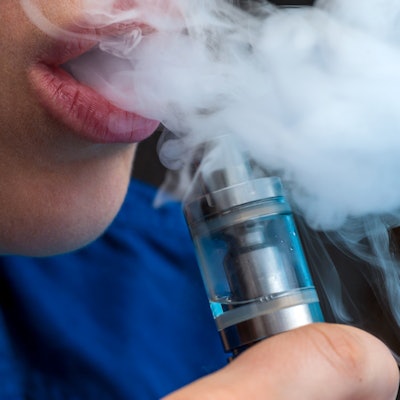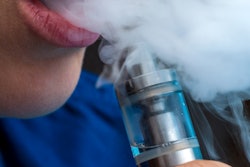
Vaping changes a user's oral microbiome and makes the mouth more prone to inflammation and periodontal disease, according to a new study by researchers from the New York University (NYU) College of Dentistry.
The altered microbiome in e-cigarette users influenced their immune environment compared with nonsmokers and cigarette smokers in the in vitro study, the researchers reported in iScience (February 26, 2020). They found that two cytokines involved in inflammatory responses (IL-6 and IL1β) were elevated in e-cigarette users.
"Our study suggests that vaping electronic cigarettes causes shifts in the oral environment and highly influences the colonization of complex microbial biofilms, which raises the risk for oral inflammation and infection," stated Deepak Saxena, PhD, a professor of basic science and craniofacial biology and a senior author of the study, in an NYU press release.
The mouth contains microbes that can influence the respiratory and digestive systems. While cigarette smoking increases the risk of periodontitis and other oral health issues, less is known about the effects of e-cigarettes or vaping.
E-cigarettes are defined as a handheld device in which a user inhales nicotine as a vapor. These devices were initially touted as an alternative to traditional cigarettes and a way to help smokers stop smoking. However, there are increasing reports of illness or deaths from these devices, and the U.S. Centers for Disease Control and Prevention has updated its initial recommendations for healthcare providers on how to deal with vaping-associated illness.
The researchers studied the oral microbiome of 119 patients (39 who had never smoked, 40 who smoked cigarettes, and 40 who used vaping devices). Almost 80% of those who smoked in the study were men, while the percentage of women in the never-smokers group was almost 44%. Participants exclusively using e-cigarettes vaped an average of 0.5 e-cigarettes per day, whereas participants exclusively using combustible cigarettes smoked an average of 11 cigarettes per day.
The researchers used a sequencing technique to profile the microorganisms in the mouths of participants. They reported that the microorganisms found varied, with the e-cigarette users having an abundance of Porphyromonas bacteria, while an increase in Veillonella bacteria was found in both e-cigarette and cigarette users.
Periodontal disease or infection was significantly higher among cigarette smokers (73%), followed by e-cigarette users (43%) and nonsmokers (28%). While bleeding on probing followed the same order (cigarette smokers, vapers, nonsmokers), the researchers reported that this result showed no statistical significance.
"The predominance of these periodontal pathogens in the mouths of e-cigarette users and traditional smokers is a reflection of compromised periodontal health," stated Xin Li, PhD, an associate professor of basic science and craniofacial biology at the NYU College of Dentistry and also a senior author of the study, in the release.
Cytokines IL-6 and IL1β were highly elevated in e-cigarette users, the researchers found. They also reported that e-cigarette aerosols made cells prone to bacterial infection, which points to a greater risk for infection in e-cigarette users.
The authors listed the in vitro study design, with cell culture models using oral pathogens, as a study limitation. They also recommended using additional intracellular pathogens such as Listeria for future studies.
Nevertheless, the researchers concluded that vaping changes the oral environment.
"Our study suggests that vaping electronic cigarettes causes shifts in the oral environment and highly influences the colonization of complex microbial biofilms, which raises the risk for oral inflammation and infection," Saxena stated.



















